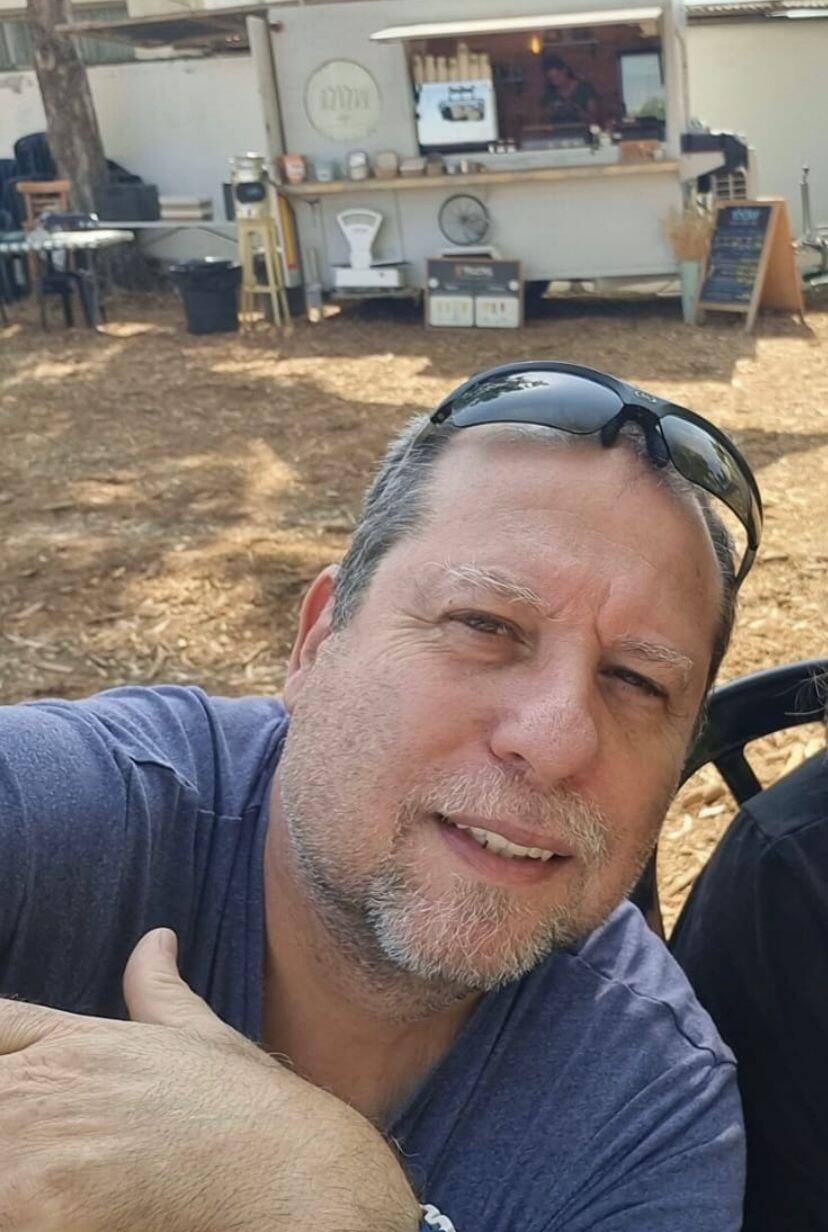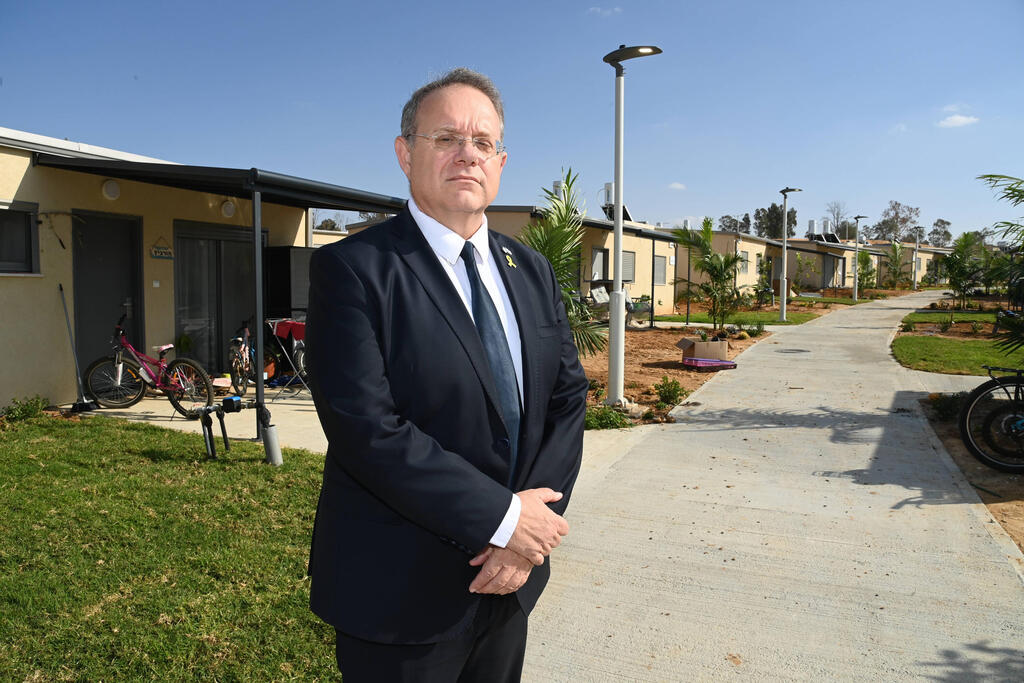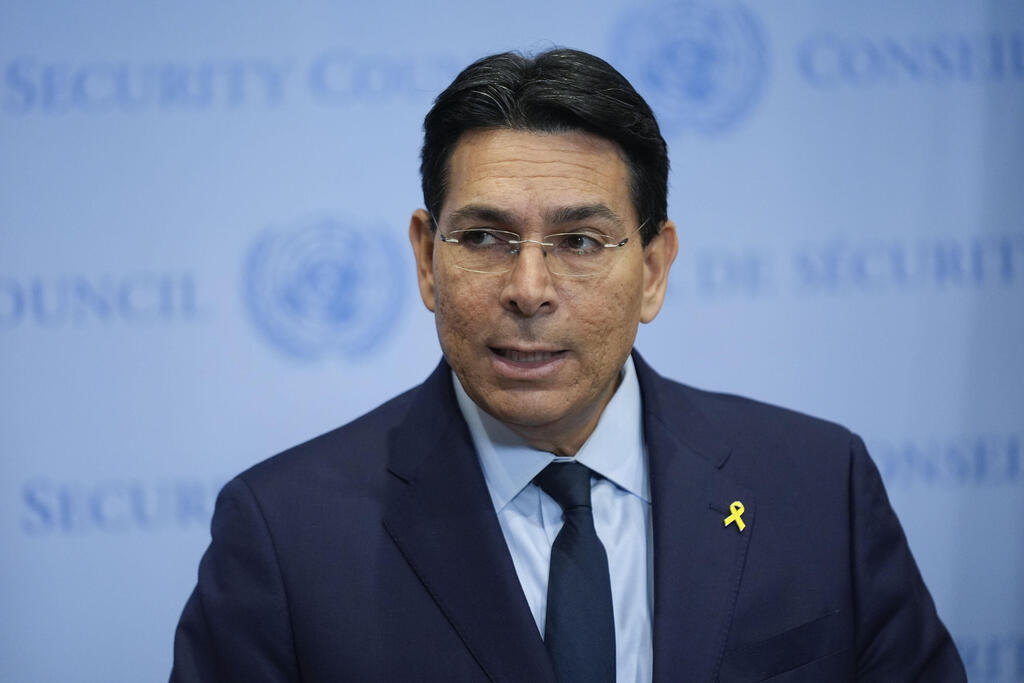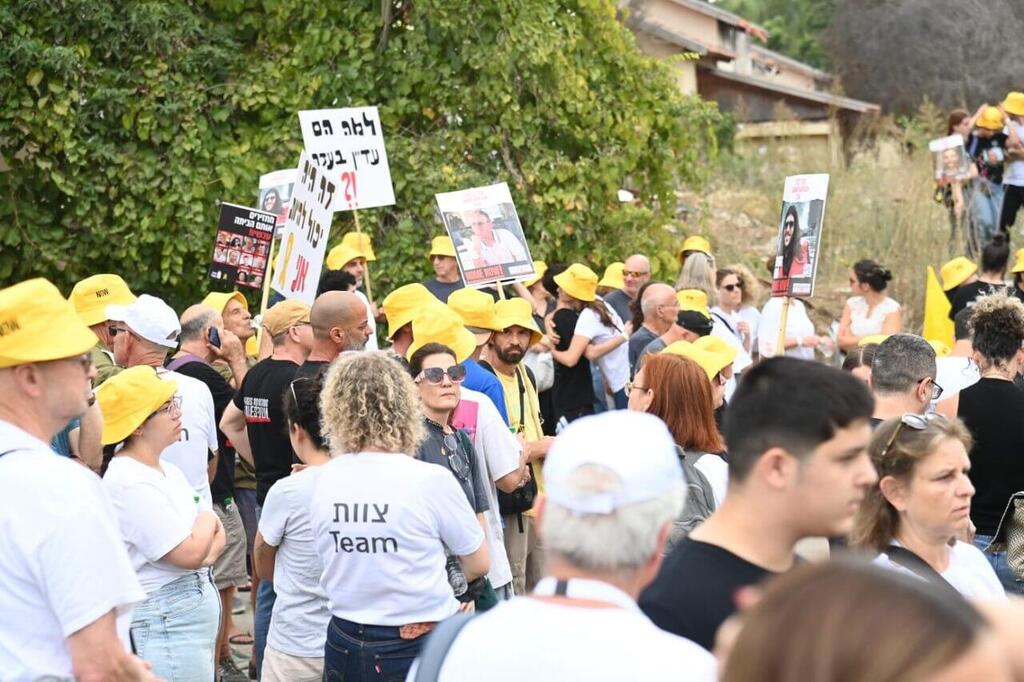Getting your Trinity Audio player ready...
Yaakov Hagoel, Chairman of the World Zionist Organization, lost his brother-in-law, Assaf Schlesinger, a paramedic at the Nova music festival, on October 7. In an interview with "Mamon" section of Yedioth Ahronoth, he speaks for the first time about the painful family tragedy, shares insights on a complex $407 million project to rehabilitate the north and south of Israel and addresses why the World Zionist Organization is still relevant 76 years after the establishment of a Jewish state. And what does Hagoel, a longtime Likud member, have to say to Miki Zohar, who is working to replace him? "Miki's attempts are a testament to the influence and power I hold. It’s unfortunate that during a time of war, when there is so much to do, I’m dragged into dealing with this."
How do you cope with such a situation?
"These were the hardest days our family has ever faced. We went from hospital to hospital amidst the terrible chaos. During the shiva, the rabbi who came to visit me mentioned that it was his seventh shiva that day. My brother-in-law left behind twins, a boy and a girl. My personal experience with this family tragedy connects me to the suffering of the families of those kidnapped. When I speak with them, I’m reminded of the heavy sense of uncertainty and fog that envelopes you. It’s extremely difficult. My eldest son served over 100 days in Gaza, took a brief leave to attend his son's Brit Milah, and returned to reserve duty. My daughter-in-law’s family also suffered a loss during the war—a cousin who was killed at Nahal Oz. We went from one funeral to the next. Our nation is in trauma."
Yaakov Hagoel assumed his role four years ago for a five-year term, amid one of the most difficult and challenging times for Jewish communities around the globe. "Since October 7, attitudes toward the World Zionist Organization have shifted. There is greater awareness of our activities and goals. Antisemitic incidents worldwide have surged dramatically. We are witnessing an eightfold increase in Antisemitic events, amounting to hundreds of such incidents per day globally. The most troubling issue is that many Jews in the diaspora are beginning to accept this situation as normal.
"They view it as ‘the price of being Jewish outside Israel.’ Even worse, many have lost faith in the ability of law enforcement in their countries to protect them. One of the most shocking recent events was the pogrom against Maccabi Tel Aviv fans in Amsterdam. The Israeli government managed to evacuate most of the fans back to Israel in record time, but the Jewish community that remained there is experiencing a deep crisis. I sent a team to Amsterdam, and they spent Shabbat with the Jewish community. The situation was extremely distressing—they were afraid to leave their homes.
"As Israelis, we fail to grasp how deeply the sense of security for our brothers and sisters in the diaspora has been shaken. I am in daily contact with representatives of Jewish communities worldwide, and I hear repeatedly that their fears today are far greater than they’ve been in years past. Jews are afraid to walk the streets, reluctant to place mezuzahs on their doorposts. Over the past year, Jewish students have felt unsafe standing out on U.S. campuses or have preemptively chosen not to send their children to such campuses at all."
Any silver linings?
"One of the things that has strengthened me the most during this past challenging year has been witnessing thousands—literally thousands—of Jews from around the world coming here to volunteer and help, despite travel warnings and the ongoing war. They’ve been willing to assist with anything, from agricultural harvests to any task we’ve asked of them. The Jewish diaspora has also contributed an enormous sum of nearly two billion dollars over the past year to various projects in Israel. This moves me deeply and is far from something I take for granted."
What can we expect for the relationship between world Jewry and Israel after the war?
"Based on the number of immigration files that have been opened, we estimate that around 100,000 immigrants are expected to arrive in Israel after the war. Since October 7, despite the complex security situation, approximately 33,000 people have already made Aliyah. As the chairman of the Zionist movement, of course, I would be delighted if everyone chose to make Aliyah, but I respect each individual's right to decide where to live and raise their children. On one hand, I encourage Aliyah, but on the other, I support strengthening Jewish communities in the diaspora because they have the right to exist and thrive anywhere in the world."
25 years together
The World Zionist Organization (WZO) was founded in 1897 by Theodor Herzl at the First Zionist Congress. The organization owns the Jewish National Fund (Keren Kayemeth LeIsrael), holds a 50% stake in the Jewish Agency for Israel and Keren Hayesod (United Israel Appeal), and manages around 20 subsidiary companies, including the rehabilitation organization HaMashkem. With an annual budget of approximately 150 million shekels and a workforce of about 500 employees—240 of whom are emissaries stationed worldwide—the WZO oversees subsidiaries that generate millions more.
"As Chairman of the World Zionist Organization, I essentially serve as the head of a massive holding company," says Yaakov Hagoel. It’s no surprise that numerous political figures, both within Likud and beyond, have their sights set on gaining control over the WZO. Hagoel was elected to his position following a heated internal battle within World Likud, and political circles are already preparing for the next elections slated for October 2025. This battle revolves around control of enormous budgets, high-ranking positions with significant salaries, and considerable power.
Hagoel is seen as a close ally of Danny Danon in World Likud. Danon's control over World Likud and WZO institutions has drawn rivals like Miki Zohar and David Bitan, who have set their sights on these centers of power. Zohar has already signed agreements with political opponents such as Benny Gantz, Avigdor Lieberman, and even Meretz, dividing control over roles and influence in the various bodies under the WZO’s purview. "I view Miki Zohar’s attempts to take my place as a significant indication of the influence and power I hold in this position," says Hagoel. "I was elected four years ago after a very intense battle. Even then, Miki Zohar, along with the Prime Minister and other senior ministers, tried to sway the elections. That battle taught me to value this role even more. I am a democrat and respect the rules of the game. It saddens me, however, that during a time of war, when there is so much to be done, I am being drawn into election matters a year ahead of time."
Could your connection to Danny Danon be working against you?
"Danny is my close friend, a dear person. We’re the same age group, and we first met in the Beitar Movement. We’ve shared a journey of over 25 years together. It’s rare in Israeli politics to have friendships that last this long. I have tremendous respect for Danny, and he reciprocates. There aren’t many people who would leave the Knesset, as Danny did, and say, ‘Friends, if I’m not a senior minister and find myself on the backbench, I’ll return to the place where I’ve made a real impact.’ And that’s what Danny did. Danny is made of the same material I am: the place where we know we can make a difference is the place we strive to be. And I’ll do everything I can to be re-elected. Once every five years, the Jewish world holds elections. Seven hundred delegates are chosen, representing the Jewish people both in Israel and the diaspora. It’s like the parliament of the Jewish people—it’s my sacred space."
Why do we still need an organization like the World Zionist Organization when a Jewish state has existed for decades?
"The State of Israel is a state for all, including the Arabs, and that’s perfectly fine. However, there are specific Jewish interests that we are responsible for, both in Israel and in the diaspora: combating Antisemitism, encouraging Aliyah, and rescuing Jews in distress. The World Zionist Organization leads projects aimed at strengthening the connection between Jews in the diaspora and the State of Israel. It actively promotes Aliyah and helps with the absorption of immigrants in Israel, supports settlement efforts, and contributes to the development of infrastructure across the country. Additionally, the WZO serves as a representative and authoritative body for the Jewish people in the international arena. It continues to play a vital role in mobilizing donations and resources for national causes."
A life of service and Zionist commitment
Yaakov Hagoel, 53, is married to Tchiya and the father of four (a 16-year-old son, a 19-year-old daughter who serves as a paramedic in National Service, a 22-year-old son, and a 27-year-old son). He is also a grandfather to two. Born in Tel Aviv, his family moved to Arad when he was seven. "My parents were true Zionists," he says. "Back in the 1970s, moving from the center of the country to the periphery was considered a significant step." Hagoel began his public service career in the Betar Movement in Arad. "As a teenager, I founded Betar in the city," he recalls. "Later, I was one of the first non-kibbutz members to do a year of service in Ofakim, where I founded a Betar branch when I was 18. Afterward, I joined a Betar Nahal group at Kibbutz Misgav Am. Back then, doing a year of service was something only kibbutzniks did. My whole life has been dedicated to Betar. I’ve held every position imaginable in the movement, eventually becoming its global CEO. Everything I’ve accomplished has been through my own hard work. I even met my wife through Betar. I’ve always wanted to go into politics to make an impact, though I didn’t think it would be in the Jewish world. At the time, I imagined becoming a mayor."
Leading rehabilitation efforts in the wake of the war
Since the war, a central focus of the World Zionist Organization has been assisting displaced residents from northern and southern Israel and rehabilitating destroyed communities. The WZO is managing 1.5 billion shekels from the Israeli government for this extensive project.
"We’ve helped establish seven new neighborhoods for evacuees:
- Shfayim and Kibbutz Ruhama for residents of Kfar Aza,
- Karmi Gat for evacuees from Nir Oz,
- Hazerim for residents of Kibbutz Be’eri, with caravans for 300 families and a separate dining hall,
- Mishmar Ha’emek for those displaced from Nahal Oz,
- Ashalim for residents of Kerem Shalom,
- Ramat HaNegev for evacuees from Kibbutz Holit.
We worked on tight schedules to ensure children could begin the school year in September. Additionally, the Settlement Division of the WZO is assisting six evacuated regional councils, encompassing a total of 47 communities."
Get the Ynetnews app on your smartphone: Google Play: https://bit.ly/4eJ37pE | Apple App Store: https://bit.ly/3ZL7iNv
"By October 10, we realized housing was one of the main challenges"
"On October 10, we identified one of the most pressing issues: housing. We turned to Jews around the world and asked for their help. The response was incredible—we received 500 keys to apartments in Israel owned by Jews living abroad. We took full responsibility for these properties, including insurance and property management, in a heartwarming project we named ‘My Home is Your Home.’ These apartments were used not only by evacuees from the Gaza border communities but also by residents of Netivot, Ofakim, and Ashkelon seeking temporary shelter. Jews even offered us their luxury homes in Rehavia, Jerusalem, for the evacuees. Some stories were incredibly touching. One Jewish family offered a home filled with valuable art pieces. I declined that offer, but it illustrates the profound solidarity among Jews worldwide."
How much have you invested in helping evacuees?
"In addition to our assistance for southern evacuees, we invested 28 million shekels in aid for evacuees in the north. It’s painful to say, but during a tour of the north, we saw that there is almost nothing left of Metula. On the way there, I also saw the Roaring Lion memorial—a landmark I know intimately from my days in the Betar Movement. It was heartbreaking to see the area in its current state. It feels just like when our parents arrived here, starting from scratch in the wilderness. A few months ago, we took on an additional responsibility: providing support to the families of hostages and returnees. This is perhaps the most sacred mission we’ve undertaken. Until then, the families of the hostages were cared for by a directorate under the Prime Minister’s Office. The WZO essentially civilianized this directorate. Colonel (Res.) Yaron Cohen, who knows every family that has experienced this unimaginable nightmare, remained in his role, joined by our appointed director, Ilan Or."
What is your vision for the future if you’re re-elected as chairman?
"In my view, the real dream isn’t just to return the residents to the Gaza border region but to bring dozens of families of new immigrants to the area to strengthen it. Immigration is not just an economic growth engine—it’s a message of hope and faith in the State of Israel. When people choose to come here despite everything, it strengthens us all. I sit in Herzl’s chair, in an office where Ben-Gurion once sat. It’s a great privilege to continue this legacy and lead the World Zionist Organization into the challenges of the 21st century."
First published: 10:01, 12.28.24





